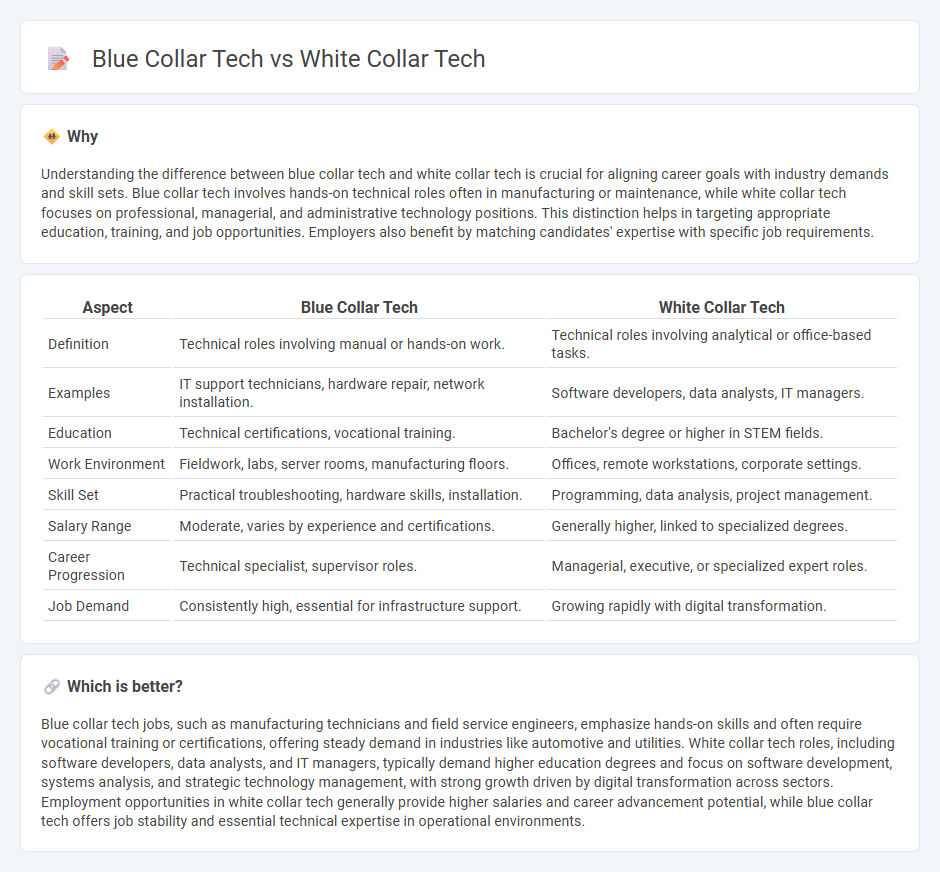
Blue collar tech roles focus on hands-on technical skills in sectors like manufacturing, construction, and maintenance, requiring expertise in operating machinery, equipment repair, and technical troubleshooting. White collar tech positions emphasize knowledge-based skills in fields such as software development, data analysis, and IT management, often involving problem-solving, strategic planning, and digital innovation. Explore the evolving dynamics between blue collar and white collar tech careers to understand their impact on the future of employment.
Why it is important
Understanding the difference between blue collar tech and white collar tech is crucial for aligning career goals with industry demands and skill sets. Blue collar tech involves hands-on technical roles often in manufacturing or maintenance, while white collar tech focuses on professional, managerial, and administrative technology positions. This distinction helps in targeting appropriate education, training, and job opportunities. Employers also benefit by matching candidates' expertise with specific job requirements.
Comparison Table
| Aspect | Blue Collar Tech | White Collar Tech |
|---|---|---|
| Definition | Technical roles involving manual or hands-on work. | Technical roles involving analytical or office-based tasks. |
| Examples | IT support technicians, hardware repair, network installation. | Software developers, data analysts, IT managers. |
| Education | Technical certifications, vocational training. | Bachelor's degree or higher in STEM fields. |
| Work Environment | Fieldwork, labs, server rooms, manufacturing floors. | Offices, remote workstations, corporate settings. |
| Skill Set | Practical troubleshooting, hardware skills, installation. | Programming, data analysis, project management. |
| Salary Range | Moderate, varies by experience and certifications. | Generally higher, linked to specialized degrees. |
| Career Progression | Technical specialist, supervisor roles. | Managerial, executive, or specialized expert roles. |
| Job Demand | Consistently high, essential for infrastructure support. | Growing rapidly with digital transformation. |
Which is better?
Blue collar tech jobs, such as manufacturing technicians and field service engineers, emphasize hands-on skills and often require vocational training or certifications, offering steady demand in industries like automotive and utilities. White collar tech roles, including software developers, data analysts, and IT managers, typically demand higher education degrees and focus on software development, systems analysis, and strategic technology management, with strong growth driven by digital transformation across sectors. Employment opportunities in white collar tech generally provide higher salaries and career advancement potential, while blue collar tech offers job stability and essential technical expertise in operational environments.
Connection
Blue collar tech and white collar tech intersect through the integration of advanced digital tools and automation systems that enhance productivity in manufacturing, construction, and administrative sectors. Technologies like IoT sensors and AI-driven analytics enable blue collar workers to operate machinery more efficiently while providing white collar professionals with data insights for strategic decision-making. This symbiosis fosters a collaborative ecosystem where skilled trades and knowledge workers contribute to innovation and operational excellence.
Key Terms
Skill Specialization
White-collar tech jobs prioritize advanced skill specialization in areas like software development, data analysis, and cybersecurity, requiring higher education and continuous learning. Blue-collar tech roles emphasize practical skills in equipment maintenance, robotics operation, and technical troubleshooting, often acquired through vocational training or apprenticeships. Explore the nuances between these tech fields to understand career pathways and required skill sets.
Work Environment
White collar tech jobs typically involve office settings equipped with computers, collaborative meeting rooms, and remote work capabilities, emphasizing creativity and strategic problem-solving. Blue collar tech roles are centered in industrial or field environments such as manufacturing floors, construction sites, or maintenance facilities, requiring hands-on skills and specialized technical equipment. Explore more to understand the nuances of these work environments and their impact on career paths.
Compensation Structure
White collar tech jobs, such as software development and IT management, typically offer salaried compensation packages with bonuses, stock options, and comprehensive benefits, reflecting higher skill demands and education levels. Blue collar tech roles, including equipment maintenance and technical repair, generally provide hourly wages with overtime pay and performance incentives, emphasizing operational expertise and hands-on skills. Explore more to understand how compensation structures impact career growth in these technology sectors.
Source and External Links
White-collar worker - White-collar tech workers are knowledge-based, managerial, or administrative employees typically working in office settings performing tasks related to technology, engineering, IT, and other professional fields; they contrast with blue-collar manual labor roles and are increasingly vulnerable to AI-driven job displacement as of 2024.
Behind the Curtain: A white-collar bloodbath - AI advancements could eliminate up to half of all entry-level white-collar jobs in tech and related sectors within the next 1 to 5 years, risking unemployment spikes of 10-20%, especially in entry-level roles across technology, finance, law, and consulting.
How AI is Causing a White Collar Bloodbath - The rise of AI is automating many entry-level white-collar jobs in areas like customer service, legal research, and data analysis, causing major companies to pause junior hiring and raising concerns about long-term career growth and economic stability in tech fields.
 dowidth.com
dowidth.com